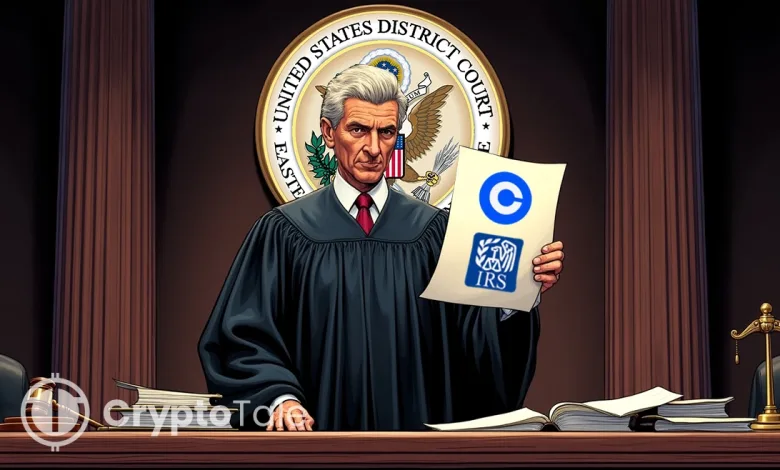Supreme Court Rejects Coinbase User’s IRS Privacy Appeal

- The Supreme Court declined to hear a case challenging IRS crypto data access.
- The ruling confirms that users lack privacy in data held by crypto exchanges.
- The decision strengthens IRS oversight and tax enforcement in the crypto space.
The United States Supreme Court has declined to review a case challenging the Internal Revenue Service’s authority to obtain cryptocurrency user data from exchanges. This decision, issued on June 30, allows the IRS to continue accessing account records from platforms such as Coinbase without a warrant.
The case involved James Harper, a Coinbase user who claimed the IRS violated his Fourth Amendment rights. Harper had argued that his financial information was accessed unlawfully when Coinbase turned over data to the IRS under a 2016 summons. That summons led to the disclosure of information from over 14,000 Coinbase users during an investigation into potential tax evasion.
The justices denied Harper’s plea without comment, leaving the lower court decision on the matter to stand, which had affirmed the IRS’s demand for the user records. That decision was grounded in the so-called 1976 third-party doctrine, which holds that individuals cannot have a reasonable expectation of privacy regarding records, such as those maintained by financial institutions.
Implications for Crypto Privacy and Oversight
The Supreme Court’s decision reinforces the government’s legal authority to collect cryptocurrency transaction data from third-party service providers. This includes exchanges like Coinbase, which store user transaction histories and account information. Privacy advocates and several voices in the cryptocurrency sector had hoped the case would prompt a reevaluation of the third-party doctrine in the context of digital finance.
Harper had claimed the difference between traditional bank records and modern digital financial records, particularly in relation to blockchain activity. He has argued that the end-users of online financial services are entitled to a higher level of privacy security.
These arguments aside, the fact that the court dismissed the hearing of the case means that the existing legal standards will still be applicable. This ruling effectively establishes that the Fourth Amendment does not limit the government’s ability to access user data as long as it is acquired through third-party channels, such as crypto platforms.
Regulation and Industry Reaction
Coinbase, the biggest cryptocurrency exchange in the U.S., had filed an amicus brief to support Harper on his appeal. The business claimed that it fought the IRS summons until it was almost in contempt of court. Coinbase expressed its concerns regarding the scope of the data request, but the exchange nevertheless complied due to legal requirements.
The IRS began its investigation in 2016 during the Obama administration. It sought data on hundreds of thousands of Coinbase users to identify unreported capital gains from digital asset transactions. Harper was among those notified by the IRS in 2019 for potentially failing to report virtual currency income. He maintained that he had fully paid his taxes.
The Trump administration, which has expressed support for cryptocurrency, also backed the IRS in this case. It argued that Harper had no reasonable expectation of privacy regarding his Coinbase records. Both current and prior White House administrations have consistently supported the agency’s investigative authority over crypto taxation compliance.
Future Challenges and the Path Ahead
This decision marks a significant moment for digital asset regulation, suggesting courts may continue to treat digital financial data similarly to traditional banking records. The ruling upholds the legal precedent that allows the IRS to request user data without a warrant when it is obtained from financial intermediaries.
Related: Coinbase Takes Stand on Crypto Privacy in IRS Data Case
The third-party doctrine remains a central element of government data collection policy, though it has faced criticism in the context of evolving digital technology. In a 2018 ruling, the Supreme Court introduced a limited exception for cell phone location data, requiring a warrant for the extended tracking of such data. Some legal experts had hoped a similar exception would be made for crypto records, but that did not occur here.
Conservative justices, such as Neil Gorsuch, have voiced skepticism about the third-party doctrine’s applicability to digital age privacy concerns. However, without a new ruling, the doctrine continues to define the boundaries of lawful government access to financial records.
Such an outcome is an indicator that things will be challenging for those people demanding more protection of their right to privacy in the online finance world. The next time efforts are made to extend the Fourth Amendment’s protection to crypto users, they may have to be addressed not by reinterpreting the law but through legislative means. Meanwhile, users of cryptocurrency are not exempt from the same legal standards as those of traditional financial services.




